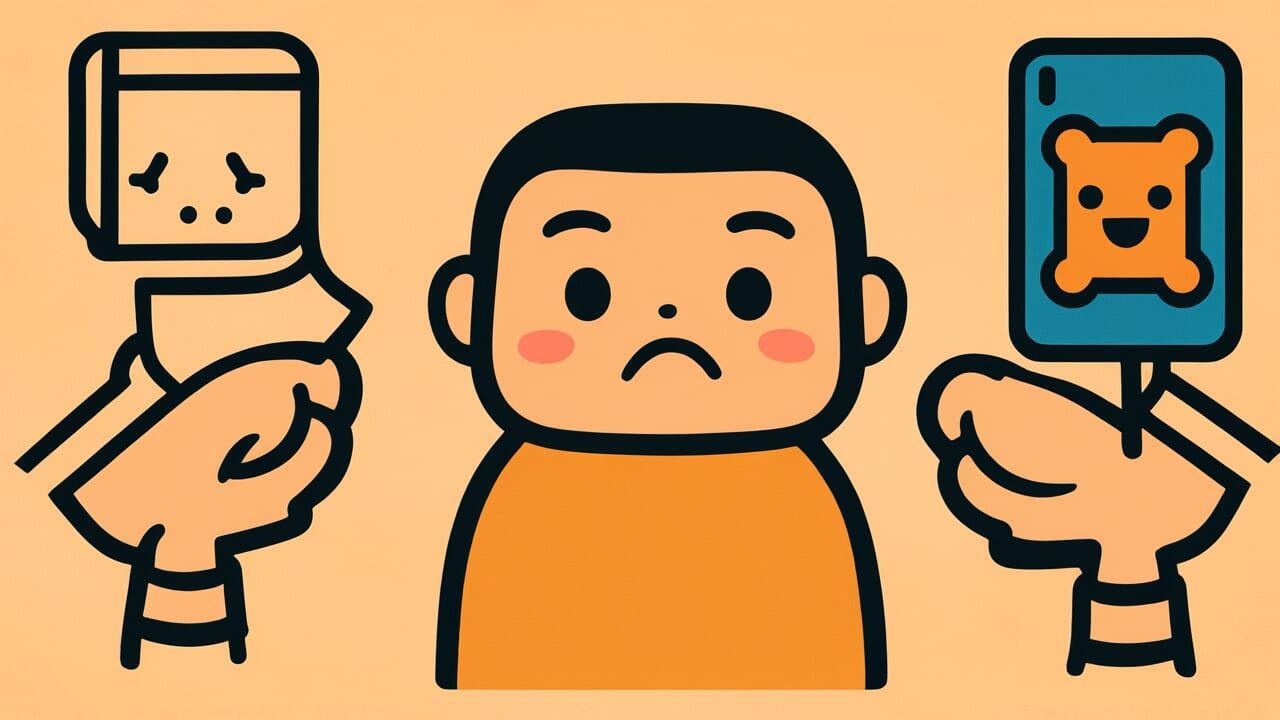How to Read “Cute cute is the reverse of hateful”
Kawaii kawaii wa nikui no ura
Meaning of “Cute cute is the reverse of hateful”
“Cute cute is the reverse of hateful” shows that love and hate are two sides of the same coin. It warns that excessive affection can dangerously turn into hatred.
This proverb points out the risks of loving too much. A parent who spoils their child might harshly scold them for the smallest mistake.
A lover who cares too intensely might become controlling. When they feel betrayed, their love quickly turns to hate.
These examples show the dual nature of strong emotions.
Even today, this saying teaches us about emotional balance in relationships. It suggests the importance of maintaining appropriate distance while respecting the other person.
The deeper your love, the greater your disappointment when expectations aren’t met. That disappointment easily transforms into hatred.
This proverb sharply captures this essential truth about human psychology.
Origin and Etymology
No clear written records explain the origin of this proverb. However, the structure of the phrase offers interesting insights.
Repeating “kawaii” (cute) twice is an old Japanese way of emphasizing something. This repetition suggests not just affection, but excessive, doting love.
The phrase “reverse of hateful” shows how love and hate are separated by a thin line.
Proverbs about emotional duality likely emerged from common people’s lives during the Edo period. Town culture of that era produced many expressions that keenly observed human nature.
Parents who spoiled their children felt crushing disappointment when expectations were broken. Lovers experienced wild emotional swings.
These repeated patterns of daily life formed the background of this proverb.
The choice of the word “reverse” is significant. Front and back aren’t separate things—they’re two faces of the same object.
This means love and hate aren’t opposing emotions. They’re actually two expressions of the same intense feeling.
This deep insight is embedded in the proverb.
Usage Examples
- I spoiled my daughter and bought her everything she wanted. Now she doesn’t even thank me, and I’m angry. Cute cute is the reverse of hateful, I guess.
- That boss adored the new employee, but turned cold after one mistake. That’s cute cute is the reverse of hateful for you.
Universal Wisdom
“Cute cute is the reverse of hateful” offers surprisingly deep insight into the complexity and fragility of human emotions.
Why does love turn into hate? Because strong affection always carries expectations.
The more deeply we love someone, the more we unconsciously create an ideal image of how they should be. When those expectations are betrayed, our disappointment grows in proportion to our love.
This proverb doesn’t teach that love itself is dangerous. Rather, it warns about the attachment, possessiveness, and desire for control that hide within love.
True love isn’t about controlling someone. It’s about watching over them while respecting their freedom.
Our ancestors knew this emotional flip could happen in an instant. That’s why they left this proverb as a warning.
Because love runs deep, we must handle it carefully. Don’t surrender to intense emotions—maintain a step back.
This proverb continues to speak this message across the ages.
When AI Hears This
If we think of affection as physical energy, something interesting emerges. We don’t feel hatred toward people we don’t care about because our psychological energy investment is zero.
In other words, the intensity of hatred is proportional to the total amount of affection energy previously invested.
In thermodynamics, energy doesn’t disappear—it just changes form. Ice becomes water, water becomes steam.
The substance stays the same, but the state changes. Affection works the same way.
Strong interest in someone doesn’t vanish when the relationship breaks. It simply undergoes a phase transition from positive to negative emotion.
For example, if you invested 10 units of affection energy daily into someone who then betrayed you, that accumulated high-density energy loses its outlet. It releases as hatred.
The concept of entropy is also noteworthy. Affection is an ordered state—a low-entropy emotion.
You wish for the other person’s happiness, predict their actions, and try to maintain the relationship. But when the relationship collapses, this order suddenly breaks down.
It transforms into high-entropy hatred. Just as ice releases massive heat when melting, the moment love turns to hate involves intense energy release.
That’s why the deeper you loved someone, the deeper your hatred becomes. This is the law of emotional energy conservation itself.
Lessons for Today
This proverb teaches modern people the importance of healthy balance in affection.
In today’s society, we can constantly check someone’s activities through social media. Read receipts let us know instantly if someone saw our message.
This environment makes excessive expectations and attachment more likely. That’s why this proverb’s lesson matters more than ever.
What’s important is respecting the other person’s freedom while maintaining affection. In parenting, romance, or friendship, the moment you try to control someone, love becomes attachment.
And when attachment isn’t satisfied, it easily turns into hatred.
Think of someone important in your life. Does your affection for them wish for their happiness?
Or does it wish for them to fulfill your expectations? This question is the first step toward building healthy relationships.
Maintain appropriate distance while respecting the other person as an independent human being. That’s what true, lasting affection looks like.



Comments